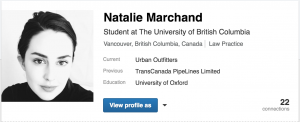During this unit I finally did the inevitable: I created a LinkedIn profile. It seemed as though I was the last person in the world to make one, as I was immediately fielding connection requests from former employers, professors, and classmates alike. Being on LinkedIn is just like having an online, interactive resume, and overall I enjoyed the process of putting it together.
The feedback that I received was very constructive; I took the time to reorganize my profile and include skills that were less common, like my knowledge of the phonetic alphabet. Some skills seem more relevant than others, but you never know what an employer may be looking for.
The formal report came into focus during this unit, and at first I was not sure about what topic to explore. Eventually I landed on the topic of campus blood drives; they tend to receive a great response online, but a lower turnout at the event itself. I decided to investigate potential methods of increasing the number of donors at future events. I was proud of the formal report proposal that I wrote; I took my time writing and editing it, and the feedback I received on my peer review reflected that. The only concrete suggestion given by my classmate was to “determine the feasibility of extending the duration of each blood drive.” I took this into account and made a minor change to the document, but otherwise kept things much the same. My next step is to start collecting primary data, and I’m excited to get started — and stay on track!
When editing my colleague’s report proposal, I realized the importance of editing. It is crucial for a proposal to be concise, yet informative; the reader should be able to find all the necessary facts without having to scan through for the information. I suggested that my partner fine tune his proposal by reorganizing it slightly and providing more information about the project itself. I was very interested in the topic that he had chosen to explore, which is incredibly important as well – all the editing in the world won’t help if the topic is not worth pursuing.
